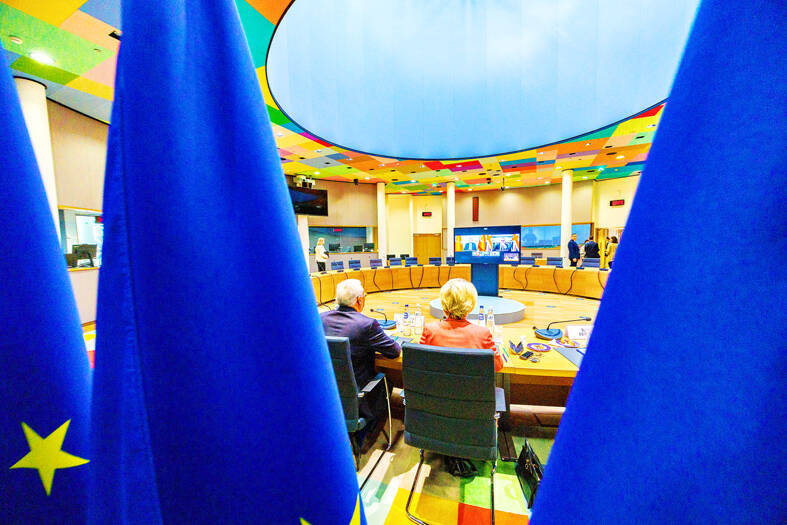European leaders holding emergency talks in Brussels have agreed on a massive increase to defense spending, amid a drive to shore up support for Ukraine after US President Donald Trump halted US military aid and intelligence sharing.
“We are moving decisively towards a strong and more sovereign Europe of defense,” European Council President Antonio Costa said. “We are putting our money where our mouth is.”
Leaders endorsed the European Commission’s aim to mobilize about 800 billion euros (US$860 billion) for defense spending, and committed to examining “as a matter of urgency” its proposal to provide members with EU-backed loans of up to 150 billion euros.

Photo: EPA-EFE
The defense plan eases fiscal rules to allow states to spend much more — at a time when Germany’s chancellor-in-waiting Friedrich Merz is embracing radical reforms to fund the country’s rearmament.
French President Emmanuel Macron has likewise called for a defense spending surge and suggested extending France’s nuclear deterrent to European partners.
Declaring that Ukraine had to be in the “strongest possible position” to secure a “just and lasting peace,” a leaders’ statement repeated calls for “robust and credible security guarantees” to deter future Russian aggression.
The text — backed by 26 of 27 states, given the expected opposition of Hungarian Prime Minister Viktor Orban, an ardent Trump supporter — said that “there can be no negotiations on Ukraine without Ukraine.”
Costa, who called the meeting, said: “Hungary has a different strategic approach on Ukraine, but that means Hungary is isolated among the 27.”
Arriving at the summit, Ukrainian President Volodymyr Zelenskiy said: “We are very thankful that we are not alone.”
European Commission President Ursula von der Leyen, who presented to leaders the 800 billion euros plan, said it was “a watershed moment for Europe” and also for Ukraine.
The meeting brought no major new aid announcements, with several EU states saying that Europe currently has enough money committed to meet Kyiv’s needs, despite the US freeze on aid.
However, Norway, a non-EU member, announced that it would more than double its aid for this year to bring the total to US$7.8 billion.
Trump’s outreach to Russian President Vladimir Putin to end the three-year war — sidelining its European partners — has thrown Europe into crisis mode.
It has also helped draw the UK closer to the EU, five years after leaving the bloc. British Prime Minister Keir Starmer is working with Macron to rebuild bridges between Trump and Zelenskiy and together they have pitched a one-month truce “in the air, at sea and on energy infrastructure.”

The CIA has a message for Chinese government officials worried about their place in Chinese President Xi Jinping’s (習近平) government: Come work with us. The agency released two Mandarin-language videos on social media on Thursday inviting disgruntled officials to contact the CIA. The recruitment videos posted on YouTube and X racked up more than 5 million views combined in their first day. The outreach comes as CIA Director John Ratcliffe has vowed to boost the agency’s use of intelligence from human sources and its focus on China, which has recently targeted US officials with its own espionage operations. The videos are “aimed at

STEADFAST FRIEND: The bills encourage increased Taiwan-US engagement and address China’s distortion of UN Resolution 2758 to isolate Taiwan internationally The Presidential Office yesterday thanked the US House of Representatives for unanimously passing two Taiwan-related bills highlighting its solid support for Taiwan’s democracy and global participation, and for deepening bilateral relations. One of the bills, the Taiwan Assurance Implementation Act, requires the US Department of State to periodically review its guidelines for engagement with Taiwan, and report to the US Congress on the guidelines and plans to lift self-imposed limitations on US-Taiwan engagement. The other bill is the Taiwan International Solidarity Act, which clarifies that UN Resolution 2758 does not address the issue of the representation of Taiwan or its people in

SHIFT: Taiwan’s better-than-expected first-quarter GDP and signs of weakness in the US have driven global capital back to emerging markets, the central bank head said The central bank yesterday blamed market speculation for the steep rise in the local currency, and urged exporters and financial institutions to stay calm and stop panic sell-offs to avoid hurting their own profitability. The nation’s top monetary policymaker said that it would step in, if necessary, to maintain order and stability in the foreign exchange market. The remarks came as the NT dollar yesterday closed up NT$0.919 to NT$30.145 against the US dollar in Taipei trading, after rising as high as NT$29.59 in intraday trading. The local currency has surged 5.85 percent against the greenback over the past two sessions, central

US Indo-Pacific Commander Admiral Samuel Paparo on Friday expressed concern over the rate at which China is diversifying its military exercises, the Financial Times (FT) reported on Saturday. “The rates of change on the depth and breadth of their exercises is the one non-linear effect that I’ve seen in the last year that wakes me up at night or keeps me up at night,” Paparo was quoted by FT as saying while attending the annual Sedona Forum at the McCain Institute in Arizona. Paparo also expressed concern over the speed with which China was expanding its military. While the US